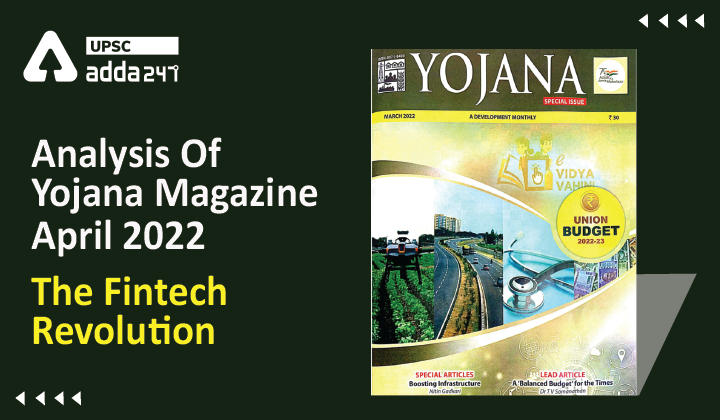Table of Contents
Analysis Of Yojana Magazine: ”The Fintech Revolution”
Relevance
GS 3: Capital Market, IT & Computers, Cyber Security, Scientific Innovations & Discoveries
Introduction
- The landscape of banking and financial sector has undergone a phenomenal transformation since 2008 Global Financial Crisis (GFC), owing to financial technology firms, popularly known as ‘FinTechs’.
- Both as creative disruptors and facilitators, FinTechs have contributed to the modern banking and financial sector through various channels including cost optimisation, better customer service and financial inclusion.
What is Fintech?
- FinTech is generally described as an industry that uses technology to make financial systems and the delivery of financial services more efficient.
- It is “technologically enabled financial innovation that could result in new business models, applications, processes or products with an associated material effect on financial markets and institutions and the provision of financial services”.
Key Enabling Technologies used by FinTechs
API (Application Programming Interface)
- APIs comprise a set of rules and specifications that software programmes use to communicate with each other. They allow new applications to be built on top of others.
Cloud Computing
- The use of an online network (‘cloud’) of hosting processors to increase the scale and flexibility of computing capacity, generating cost savings.
Biometrics
- The study of distinctive and measurable human characteristics that can be used to categorize and identify individuals.
DLT (Distributed Ledger Technology)
- A digital system for recording the transaction of assets in which details are recorded in multiple places at the same time.
Big Data
- Voluminous amounts of structured or unstructured data that can be generated, analysed and utilized by digital tools and information systems.
AI (Artificial Intelligence) & ML (Machine Learning)
- IT systems that can perform functions that would otherwise require human capabilities. ML entails computers learning from data without human intervention.
How FinTechs has been changing the banking scenario in the country?
- FinTechs have played an important role in unbundling banking into core functions of settling payments, performing maturity transformation, sharing risk and allocating capital.
- The information and telecommunications (IT) revolution is regarded as the fifth ‘Technological Revolution’ driving growth, and FinTech is at the helm of this creative disruption.
- With time the scope of operations of FinTechs has also broadened, moving from crypto assets to payments, insurance, stocks, bonds, peer to peer lending, robo-advisors, regtech and suptech.
- FinTech has the potential to fundamentally transform the financial landscape, provide consumers with a greater variety of financial products at competitive prices, and help financial institutions become more efficient.
Safety Measures
- As a facilitative regulator, the Reserve Bank has broadened the scope of priority sector lending to include start-ups.
- In order to overcome internet connectivity problems as major hurdle for digital payments in rural areas and encourage innovations that enable offline digital transactions, the Reserve Bank has announced a pilot scheme under which, authorised Payment System Operators (PSOs) including banks and non-banks, will be able to provide offline payment solutions using cards, wallets or mobile devices for remote or proximity payments.
- Over the years, the Reserve Bank has prioritised security measures for digital payments such as the requirement of Additional Factor of Authentication and online alerts for every transaction.
- These measures have significantly increased customer confidence and safety leading to increased adoption of digital payments.
Way Forward
- Going ahead, FinTechs need to prioritise regulatory compliance and the management of cyber risks. They should design and implement cyber-risk prevention frameworks and regularly conduct penetration tests.
- The rapid and transformational changes brought on by FinTech need to be monitored and evaluated so that regulators and society can keep up with the underlying technological and entrepreneurial flux.



 TSPSC Group 1 Question Paper 2024, Downl...
TSPSC Group 1 Question Paper 2024, Downl...
 TSPSC Group 1 Answer key 2024 Out, Downl...
TSPSC Group 1 Answer key 2024 Out, Downl...
 UPSC Prelims 2024 Question Paper, Downlo...
UPSC Prelims 2024 Question Paper, Downlo...




